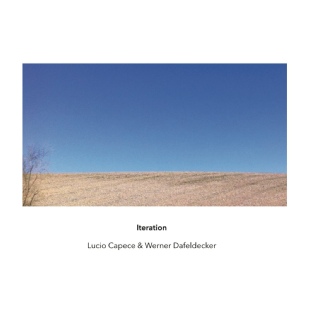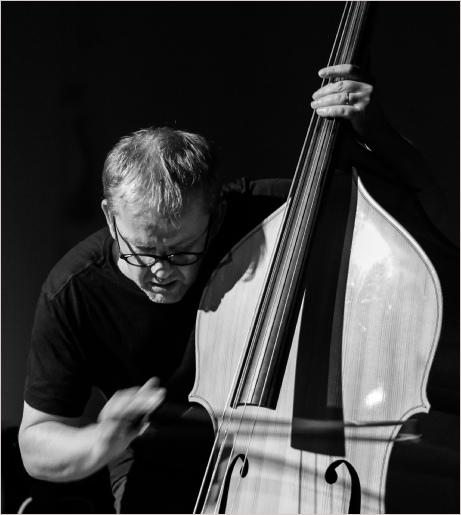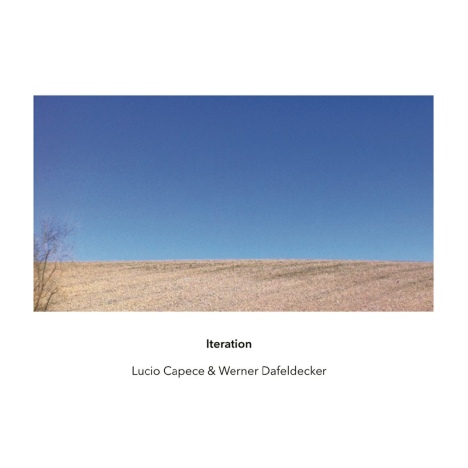Another Timbre TimHarrisonbre
Interview with Werner Dafeldecker
Tell us a bit about the two pieces on 'Iteration' - how much was the music pre-planned
and/or improvised?
The two pieces were recorded last year during our live performance
at the ‘Offene Ohren’ concert series in Munich. On the disc are two unedited improvised
sets. Lucio and I have known each other for many years and play together periodically.
So the music was maybe ‘pre-planned’ to some extent, but only in the sense that we
share similar interests and a similar history when it comes to content and methodology
in improvised music.
Could you say a bit more about that shared history in relation to improvised music? Lucio was very involved in the ‘reductionist’ turn in improvisation from the mi-90’s. You were in Polwechsel at around the same time, so did you have a similar or different trajectory, and did or do you see your music as ‘reductionist’?
When I refer to shared history I mean that both of us have been interested in improvisational concepts away from emotional expression and/or jazz-routed music. I think we also share a non-dogmatic approach when it comes to the term „reductionist“ music. In my opinion the term is an imposed category which tries to describe a social cultural shift of the values in that specific field of music at that time. Density or emotionality were often replaced by a certain degree of clarity of structure and tonal accuracy. I clearly have been involved in that relocation which, like every change, leaves its mark.
Free improvisation had first emerged in the late 60’s, and for me personally the cultural shift you refer to in the late 90’s reinvigorated the music in a very positive way. Now, 25 years on from that, how do you see improvised music developing?
In line with the social developments of the past decades, and their distortions, I cannot see clear lines in today‘s improvised music. The rapid economic and media developments led to extreme individualisation, and this also affected the conditions and working methods of the improvising musicians and their surroundings. I ask myself which line of attack musicians will develop to reflect today's social upheavals, and what function improvised music will have in the near future....
Going back a bit, how did you start out in music, and what brought you to experimental
music?
I’ve been involved in music for around 35 years now. But I had no background
in music until the age of 13 when I started to play electric bass. In the mid-80’s
I turned to the double bass and enthusiastically worked with the Austrian Ensemble
Ton.Art. Our music was a hybrid of the second Viennese school, free jazz and third
stream music. (Mingus, Dolphy, Webern, Kogelmann)
At that time I locked myself into
the rehearsal room and discovered the beauty and fragility of my instrument. An ear-opening
sensation in that period, and one which gave me confidence to continue, was a Bill
Dixon workshop held at the ‘Wiener Musikgalerie’ in 1985.
Was that same hybrid grounding (second Viennese school | free jazz | third stream) also underlying the releases on the Durian CD label which you co-ran for some years, or had the focus shifted by then?
No Durian came after that period. Uli Fussenegger and I founded the label with our acoustic double bass duet titled „Bogengänge“. The further idea was to create a platform which enabled us to release new music, electroacoustic and improvisational concepts all on one label. At that time such a thing did not exist in Austria and was in high demand by the artists. The focus had shifted by then because there has been a much more liberal exchange between the genres. Parallel to that our work with Polwechsel has taken shape.
A lot of the music you have made involves either improvisation or bringing a good deal of creativity to interpretation. Have you also worked as a composer, or does this not appeal to you so much?
In my ideal case there is a symbiosis between composer and interpreter. If ideas are coming up, I try to develop adequate methods to implement them.
This can be a verbal agreements, a notated score or computer assembled structures and everything in between. Since my work in general is very sound-based, it is more fruitful if I work closely with the musicians during the development process. Some examples can be seen here
contemporary music scene in Vienna always seems busy and creative. When did you move from Austria to Berlin, and why?
I fell in love with my future partner and moved to Berlin in 2006. That was not a big leap for me, because there was already a lively musical exchange between the two cities.
Berlin is home to a huge number of talented and committed musicians, which I imagine brings some problems as well as many advantages. How do you see Berlin’s experimental music scene now, and what problems does it face in the future?
I would say the benefits in Berlin - social life, Internationality, open-mindedness are greater. Due to changing structures and a new generation of improvising musicians it has become more difficult to focus on "the scene“, which in my view is not a disadvantage. In any case, I do not plan to leave the city in the foreseeable future.
at162 Lucio Capece & Werner Dafeldecker - ‘Iteration’
Two improvisations recorded in Munich, May 2019
Part One 23:09
Part Two 21:58
Lucio Capece - bass clarinet, slide saxophone, mini speakers with feedback
Werner Dafeldecker - double bass


Werner Dafeldecker

Cover photograph by Lucio Capece